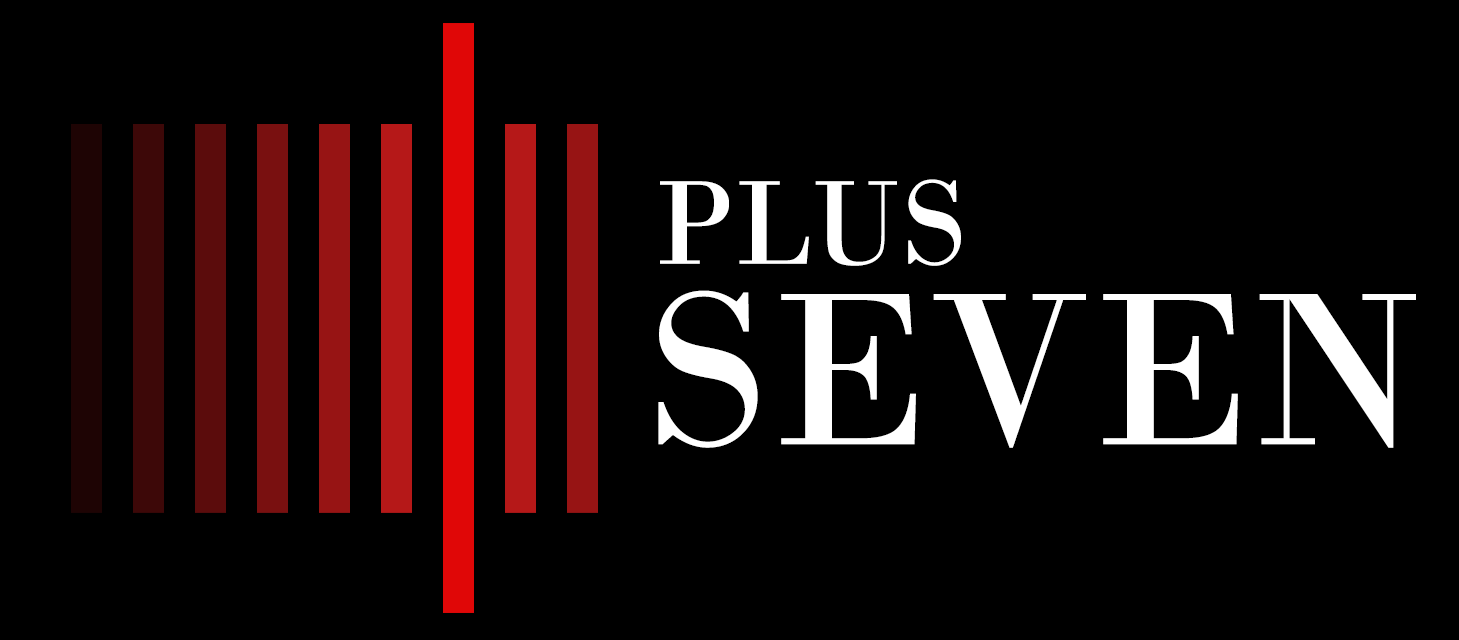Debunking Monking Part III: the addict’s vow
Thamkrabok is disappointingly easy to get to for a questing hero. It lies a mere 60 miles from Bangkok, not far from the main highway North. Back then, international flights still came into Don Muang, which is also on that same highway, and has a bus-stop, train-station, and taxi-rank right outside.
Still, there had been challenges – the main one in practical terms being that I couldn’t find my passport. With barely enough time remaining before my flight to rush through an express application, this involved considerable expense and paperwork, persistent pushy phone calls, and early starts to wait in long queues.
This brought up the main challenge in more fundamental terms: whether I really had the will to go through with this. The addict mind is always alert to any possible claim that an obstacle is too great – always looking for a way to remain in that seductive limbo where we really are going to quit, just not quite yet.
Another was that the airline mislaid my suitcase somewhere in the Middle-East. So I eventually crawled (okay – walked a little slowly) into Thamkrabok with little more than I was wearing. That felt more appropriately epic, along with beginning to feel the flu-like first symptoms of withdrawal, having taken my last wallop at Heathrow some 18 hours previously. It was the early evening after a long GMT+7 day, and my mind was almost entirely focussed on getting some sleep while I still could, since full-on opiate withdrawal brings total insomnia for about a week.
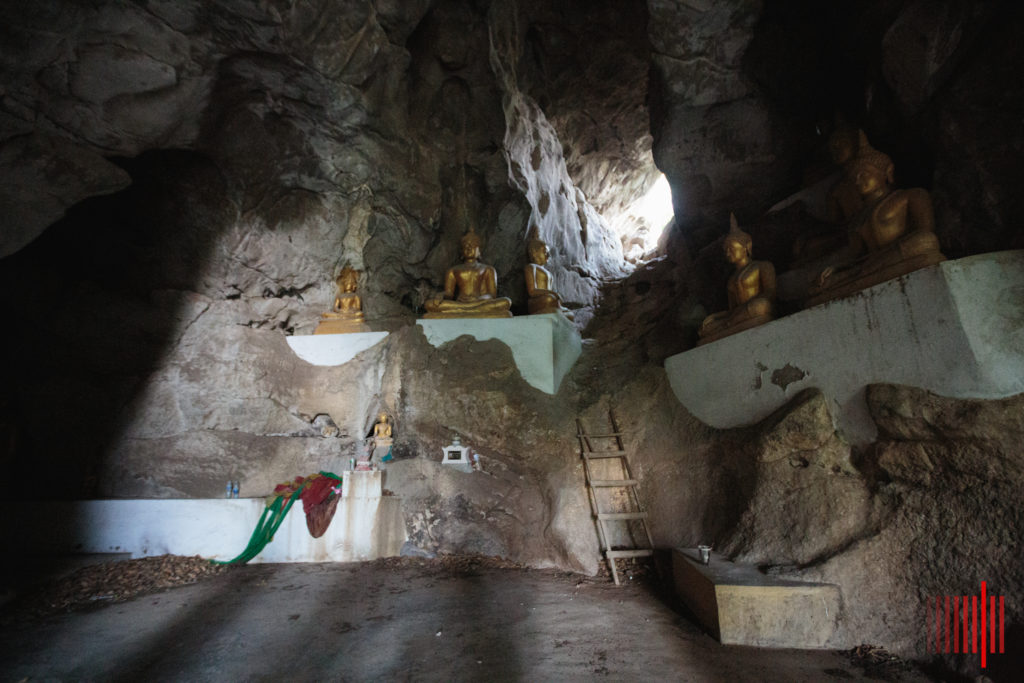
The secret revealed (?)
The monastery seemed deserted. The reception office was closed, and there was nobody to ask where I should go. After a bit of random wandering, I followed faint signs of life to a gated area, which turned out to be the detox. I found a young Thai monk apparently waiting for me. We couldn’t communicate much, but he went to find Phra Hans who, after minimal pleasantries, told me that now we would have to go and find yet another senior monk to administer a sacred oath called a “Sajja.”
I trailed listlessly after him as he explained that this was considered terribly important. Without it I would not be able to begin the treatment tomorrow. We fetched up in the main hall of the monastery, waiting and listening while around 100 monks finished their evening chanting (this having been the reason why the monastery had seemed empty on my arrival).
Even in my dull and unreceptive state, it began dawning on me that I had come into an environment unfathomably unlike anything I had previously known. And where people might be working under a very different set of criteria from what I had assumed was the operating system common to all humanity.
If that seems like a romanticised response to the now-familiar sound of monks chanting, which I can be quite blasé about these days, well – things are what you make them, and it sets the next scene nicely. The reverberation of the last notes was still dying away as Phra Hans herded me over to where the chanting leader was seated. This was Ajahn Wichien, who is now the Abbot of Thamkrabok, and is blessed with a face that appears monumentally unimpressed with anything you have to say before you have thought it, let alone said it.
I was instructed to light three incense sticks, drop three kneeling bows to a large black iron Buddha at one end of the hall, and then repeat the formal words fed to me line-by-line. Being as I am now, a keen student and connoisseur of the melodious Thai language, I don’t doubt that the words I spoke then were butchery of the most gruesome kind. Still, they seemed solemn and weighty enough to my undiscerning mind, and I suppose I felt that something had definitely happened. But now, I could finally go to bed, so I thought no more about this until the next day when Phra Hans re-appeared and briefed me a bit more about what to expect.
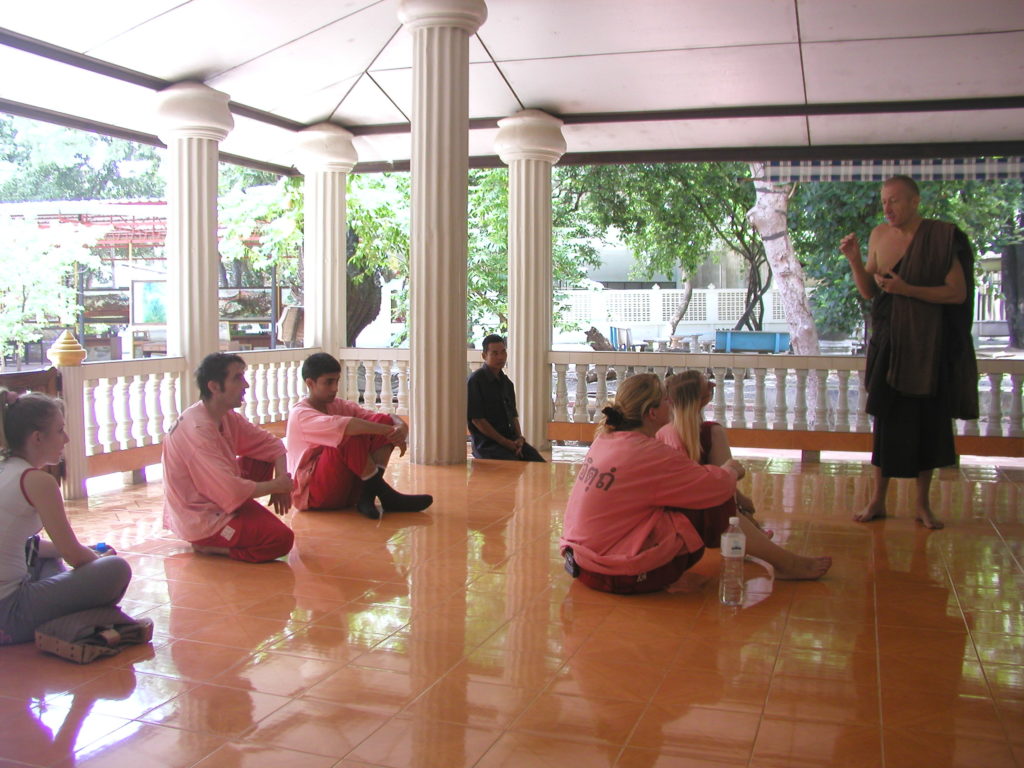
The vow I had just taken declared that I would abstain from addictive substances for the rest of my life, and although there were of course many other things to explore, he kept returning to this insistence that Sajja itself was the key to my liberation (and to many other things besides). I will admit to not being massively impressed at this stage. I had probably been expecting him to reveal cool Jedi stuff that would somehow make doing difficult things not be difficult, while this just sounded like: “the secret to quitting drugs… is to say that you’re quitting drugs. Congratulations – you just quit drugs.” Well, wowzers. I had said that many times – every addict has – and now apparently, I had come halfway around the world to say it again.
Long Dark Night of the Asshole
But I didn’t have a better plan. Over the course of an insomniac week, I had no shortage of opportunity to consider this more deeply by night, and discuss it with my patient mentor by day. At some point around days four or five, which are peak awfulness for opiate withdrawal, I decided I could roll with the idea that maybe it kind of is that simple. Kind of. Thusly my reasoning:
Why had it seemed to me obviously absurd to think that words could really change anything? Well, that could only mean that I thought my word meant nothing. Was that a problem, or was I okay with that? To kill time while not-quite-facing-up-to that question, I tried excusing myself from full personal responsibility on the grounds that this seemed to be a societal norm.
Even just the words, “vow”, “oath,” sound comically old-fashioned. We take vows when getting married, I suppose, but fully expecting to be able to get out of them, so they’re not really vows. We just keep calling them that for sentimental reasons – the concept itself is quite passé. And the only place you are likely to encounter an “oath” these days is in court, which again isn’t really an oath at all, is it? That might be more accurately described as: “the truth, or something that passes for it, extracted under threat of punishment.” Didn’t that seem rather sad? That we assume ourselves to be carefree liars unless sufficiently intimidated? Maybe I could aspire to do better? Yes, but “could” still doesn’t get us to “should”. Should I?
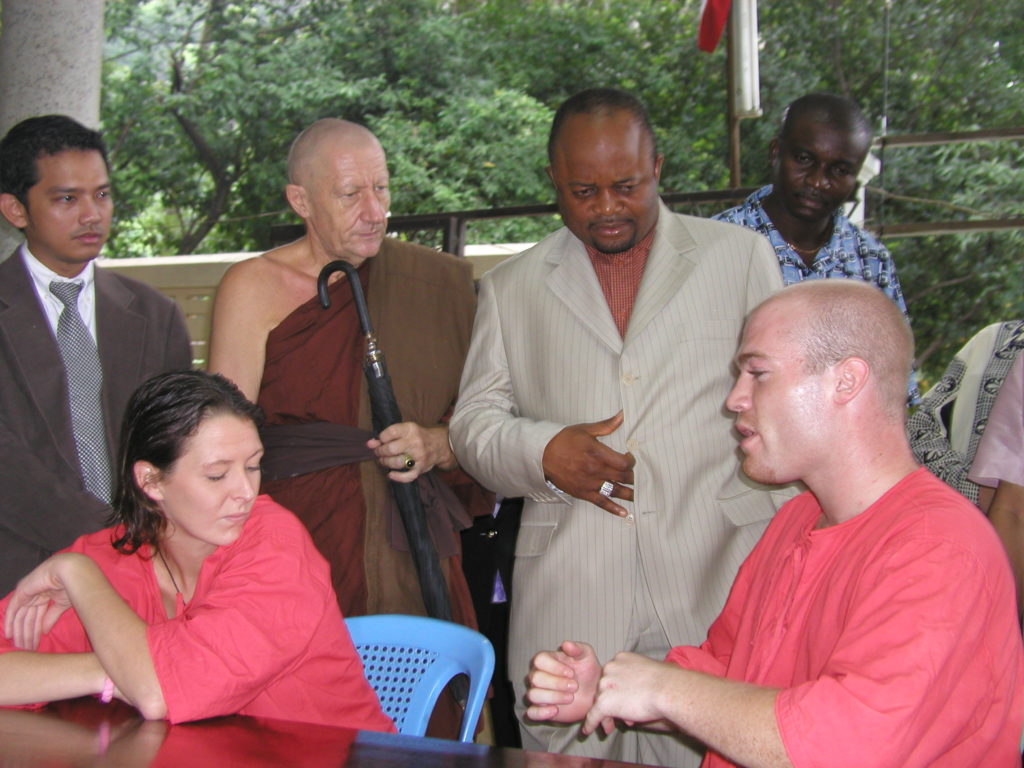
Phra Hans said I should. We delved deeper into Sajja, which literally means “truth” in Pali, so that’s rather more than just making promises. Perhaps “integrity” would be the best word for it in English, since it is one of ten qualities called “Parami,” which are a checklist for the development of good character. It is one that is particularly emphasized at Thamkrabok, and Phra Hans encouraged me to view it as the essential quality that unlocks the other nine. That made sense, since without it, any other qualities you might claim to have are unreliable at best, hypocritical at worst.
Of course, simply having made a vow couldn’t rescue me from my addiction. It is a firm determination to become a person of integrity – the kind of person whose word might mean something – that could retrospectively build strength and substance into that vow. As well as just being just quite a cool thing in itself, obviously. Okaaayy.. I was giving him the benefit of the doubt since I wanted to feel noble and inspired. By day, anyway. By night, of course, cynical junkie Gollum came out to argue with good Smeagol.
Alright, I’ve got a thing about LoTR, but again this really is a most appropriate image for what was happening, since at this stage the internal debate was up there on the broad-strokes mythical themes level – Dark vs. Light, Self-Pity vs. Heroism, and most specifically in this instance: Cynicism vs. Ideals. Gollum always makes a compelling case, since it’s far easier to undermine than to build, and there is little in this world that is so perfectly constructed that it doesn’t give him a crack he can sidle into. I was winning for now, but mainly on gung-ho, momentum, and a kind of forced shaky optimism. That wouldn’t hold up for long. I needed more detail, more substance, and more concrete proof that something here couldn’t just be sneered away in the long dark nights.
Harvest your integrity
‘A “why?” is great, but a “how?” is bloody useful’ – not Nietzsche
One distinguishing feature of Buddhism is that it provides its adherents with lots of things to do. Buddha seems to have been a very practically-minded fellow. So rather than just telling people to try to be a certain way, he created a smorgasbord of practices. No, not ritual practices or prayers (these, in fact, seem to have been entirely absent from original Buddhism as there is no mention of them in the scriptures). But things to do with your body and mind that are designed to re-engineer your habits, perceptions, and mental processes. These might be most easily understood by a modern person as being more akin to psychology than religion, at least as that word is generally used. This was great news – I was doing altogether too much thinking, and needed some activities to get my teeth into.
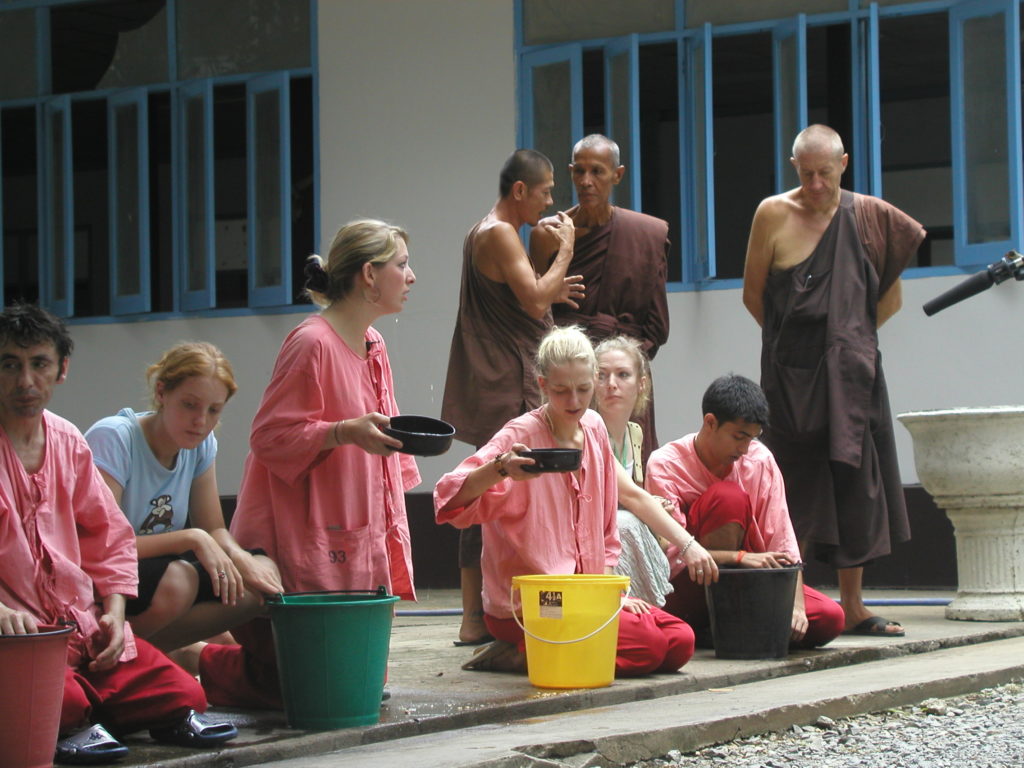
Phra Hans suggested that I start incorporating small sajjas into my days, using them to train my will and resolve. When he led us in meditation, he would start by repeating that same formal vow I had taken on the first day. Only, this time I was undertaking to sit for the appointed time, no matter what (a bigger deal than you might think when you’re dealing with the twitchy body and scattered mind of a junkie in withdrawal). He also encouraged the use of a less formal, self-administered version to use with mundane tasks, particularly the ones I didn’t want to do.
I could see obvious utility in that, alright. But I also discovered something I really hadn’t expected – my mind actually quite liked discipline and order. There was undeniable tranquillity that came with having made a decision – even an unpleasant one – and knowing that I was going to go through with it until it was done. Because of my integrity!
Well, that was a small epiphany about a small thing, and good as far as it went. However, I still didn’t know how well it would translate to something larger, such as whether I really could swear off drugs for the rest of my life. What else do we have? Buddhism also has a wide range of purely mental practices, which structure thinking and perceptions along certain lines. Try this one –
There is a phrase used several times in the sajja vow, and indeed recurring frequently throughout the Dhamma: “Together with body, word, and heart”: mind, word, and action. Sajja requires these to be unified, but first, our attention is deliberately drawn to them being three different things. Why? Well, we’re often very fuzzy about distinguishing them, and that creates all kinds of problems. If we open our mouths too soon and too often – as most of us do – then speech actually gets incorporated into the thinking process. Then because we’ve said something we identify with it, especially in the light of other people’s reactions – we want to defend it if they disagree, enlarge on it if they seem impressed. It takes on a life of its own as “my opinion,” and before we know it, we have somehow flowed into acting on it, or planning to in ways that are hard to back out of. And that, friends, is one (of several, but a major) reason why the thing we spend most of our time doing in life is… the same old shit, even when we said we wouldn’t. It can be very useful to become more mindful of where those boundaries are.
But the “word”, that connects the other two elements, isn’t just the things we say out loud. It’s useful to call it that and to train it there because that’s where we naturally see it most clearly as distinct from the other two, but it still exists when you are alone or silent. It’s the entire level of discursive thinking, the stories we tell ourselves, the myths and fairy-tales we live by.
Every time you talk yourself out of doing something you know you should do, every time you make a lame excuse, every time you make a tragic hero of yourself and ruefully say “why does this always happen to me?” when you actually know why on some level that you are refusing to look at, and you know that maybe it doesn’t have to happen the same way tomorrow – that’s where you would benefit from training in Sajja.
Here is a very straightforward way to cultivate Sajja – on a regular basis, ask yourself two questions: “What am I telling myself now that isn’t true?” and, “What am I not telling myself that is true?”. These will start to move the heart and word into closer alignment, and will naturally flow on to another question: “What am I telling myself now, that is true, that I am not acting on?” Boom! That’s the hat-trick, all three ducks in a row. INTEGRITY!
Smeagol always helps!
I needed to talk this over with Gollum.

“Nasssty monkses!! What does they know about REAL people’s problemsses? Hiding from life on their pink fluffy cloudses in silly monassteriesses? Making silly little listsess, SILLIES!…”.
Alright, I don’t think I can keep this up. What I think Gollum meant to say was actually a very well thought-out and articulated bullet-pointed argument that went like this:
1) It’s all very lovely piddling about sweeping leaves and congratulating ourselves for doing the bloody laundry, far from stress, tedium, and temptation, but you have to go much further and deeper and more radical with this “Buddhism can change you” schtick, or it won’t hold up.
2) It’s all very lovely pontificating about grand narratives and ideas and becoming a true and comelie knight on a white steed, but this has to get a lot more specific and immediately applicable, and somehow visceral. I mean, really – in the flesh – or it’s just a load of pompous horseshit serving no purpose except to make you feel good and clever right now, and it will all crumble as soon as you get a whiff of smack.
3) I’m scared. I’m scared of failing because I don’t think I have it in me to do this again, which is why I’m being so cynical. And I’m scared of succeeding because I fear that everything I’ve just said is going to involve losing a lot of stuff that I’m very attached to in order to gain something unknown.
4) Let’s get some smack – I hear it’s really good in Thailand.
As I said, Gollum always makes a good case. Point 4, particularly, is a humdinger. This clearly demanded a robust response. Clearly, we found one, since I’m now telling you this stuff, instead of re-enacting the opening scene from Apocalypse Now. It went something like this.
1) Absolutely – let’s get stuck straight into some significantly heavier practices that will produce immediate, visible results. We need to whip up some evidence-based faith here. Let’s go.
2) Yep – you need to understand something about philosophy: it’s real. It isn’t an outmoded parlour game played by French intellectuals and stoned people. It isn’t enjoying talking about clever ideas – it’s the set of basic assumptions you make about how life works, which you actually live by. You have a philosophy now, you just don’t call it that. It isn’t a good one. We’re looking to replace that with something that works better, not bolt something on.
3) Yes, it will. There is no meaningful transformation that does not involve sacrifice, I’m afraid Buddha is quite clear on that. I could quote you chapter and verse, but this is the quick answer. We’ll start with your rubbish philosophy. And as for the first fear, well – good. Hold on to that.
4) Er.. yeah, it is. Let’s just put that on hold for now. But there is no way to sugar-coat this pill – you are giving something up. Something that you like. Did I mention sacrifice?
So there we end up with the starkest, simplest meaning of Sajja – facing up to things as they actually are, not as we would like them to be. That’s always going to hurt a bit, because it’s nice in Storyland. Of course it is, otherwise after a hard day reading books and watching movies, we’d treat ourselves with an hour or two of real life, to chillax and unwind. But the problem with Storyland is that the time just flies in there, and real life continues apace whether you are paying attention to it or not. Decades can fly by while you are still telling yourself the same comforting stories.
So – time, your life. That’s the cost of dishonesty. The cost of honesty is having to leave familiar, maybe cherished things behind as soon as you realise that they are just stories. You have to be fearless and sometimes even brutal about not tolerating the whiff of bullshit, because you can so easily get sucked into the story. And it can be quite lonely at times. But the longer you leave it, the harder it gets, Preciousss.
About the author
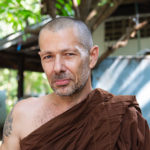
Phra Peter Suparo
History geek. Enjoys sitting around doing as little as possible. Semi-retired bon viveur. Eternal student. Elf-friend. Theoretically in favour of humanity.
